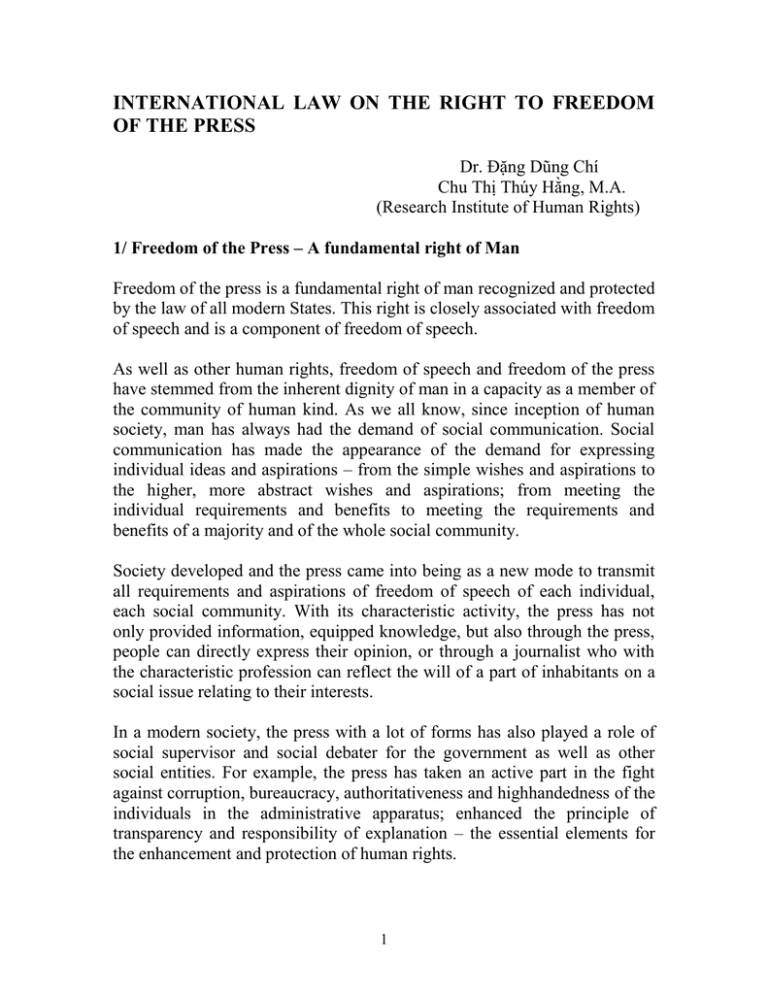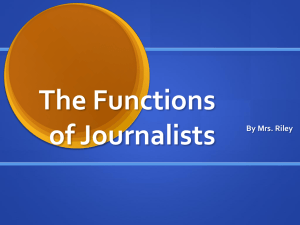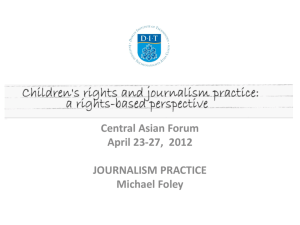international law on the right to freedom of the press
advertisement

INTERNATIONAL LAW ON THE RIGHT TO FREEDOM OF THE PRESS Dr. Đặng Dũng Chí Chu Thị Thúy Hằng, M.A. (Research Institute of Human Rights) 1/ Freedom of the Press – A fundamental right of Man Freedom of the press is a fundamental right of man recognized and protected by the law of all modern States. This right is closely associated with freedom of speech and is a component of freedom of speech. As well as other human rights, freedom of speech and freedom of the press have stemmed from the inherent dignity of man in a capacity as a member of the community of human kind. As we all know, since inception of human society, man has always had the demand of social communication. Social communication has made the appearance of the demand for expressing individual ideas and aspirations – from the simple wishes and aspirations to the higher, more abstract wishes and aspirations; from meeting the individual requirements and benefits to meeting the requirements and benefits of a majority and of the whole social community. Society developed and the press came into being as a new mode to transmit all requirements and aspirations of freedom of speech of each individual, each social community. With its characteristic activity, the press has not only provided information, equipped knowledge, but also through the press, people can directly express their opinion, or through a journalist who with the characteristic profession can reflect the will of a part of inhabitants on a social issue relating to their interests. In a modern society, the press with a lot of forms has also played a role of social supervisor and social debater for the government as well as other social entities. For example, the press has taken an active part in the fight against corruption, bureaucracy, authoritativeness and highhandedness of the individuals in the administrative apparatus; enhanced the principle of transparency and responsibility of explanation – the essential elements for the enhancement and protection of human rights. 1 In many States, the press has also made a contribution to recommending the solutions to overcome the challenges and barriers; honor the individuals for their sacrifices for the community, for social progress. In this aspect, the press is regarded as an effective means to intensify the understanding, develop the ideas and push ahead the linkage of entities in the society. So, the press has played an extremely necessary role for any society and created a solid foundation for all democratic societies. Nowadays, the press has also played an important role in enhancing human rights through the activities of propaganda and education of human rights as well as discovering the violations of the fundamental rights and freedom of citizens. 2/ Freedom of the press in the international law on human rights As we all know, ideas and realities of human rights have existed in all cultures, but the concept of human rights and its intension as of today, once born was closely associated with the bourgeois revolutions, in which human rights in general and the rights to freedom of speech and the press in particular, had been established for the first time in the constitutions and laws of a number of Western countries. However, only until when the United Nations Organization came into being, human rights, in which the rights to freedom of speech and the press were recognized and protected on a global scale. The Universal Declaration on Human Rights (UDHR) in 1948 was acknowledged in Article 19: “Everyone has the right to freedom of opinion and expression; this right includes freedom to hold opinions without interference and to seek, receive and impart information and ideas through any media and regardless of frontiers” To concretize the Declaration, in order to create the legal basis for the respect, protection and implementation in all the member countries when participating in the human rights system, the UN General Assembly compiled the International Covenant on Civil and Political Rights (approved in 1966 together with the International Covenant on Economic, Social and Cultural Rights and they were put into force in 1976). Also in Article 19, the Covenant clearly says: “1) Everyone shall have the right to hold opinions without interference. 2) Everyone shall have the right to freedom of 2 expression; this right shall include freedom to seek, receive and impart information and ideas of all kinds, regardless of frontiers, either orally, in writing or in print, in the form of art or through any other media of his choice….” So, the right to freedom of speech is associated with the right to have one’s own opinion and it is the double right; in a sense to have the freedom to seek, receive and impart information and ideas through all the forms of expression – orally, in writing or in print, in the form of art or through the press, including new technology…. Freedom of the press under freedom of speech also has the double right: the right to receive and impart information. It is this character that creates the characteristics of the media and those who work in this area. The law of all State reserves the “privileges” in receiving and imparting information for the press. As well as the human right in general, the right to freedom of speech and the right to freedom of the press have the dialectical relationship with other rights. Article 17 (the inviolable right to privacy and personal identity), Article 18 (the right to freedom of thought, belief, religion), Article 25 (the right to participate in the State and social management) and Article 27 (the right of the ethnic minorities) have the content and demand for the right to hold private opinions and the right to freedom of speech. The right to hold opinion and freedom of speech are also the basis to implement to the full a series of other rights of man. For instance, the right to freedom of speech is indispensable so as to be able to enjoy the right to have meetings, set up associations and carry out the right to elect and to stand for election…. In its turn, the right to freedom of speech and freedom of the press also needs the “support” of other rights such as the necessities for the effective implementation of this right. For instance, the right to live (Article 6); the right to the inviolability of the body (Article 7); the right to individual freedom and security (Article 9); the right to get access to information. To put human rights, in which there are the right to freedom of speech and the press, into full effect, the role of all State is always needed, because the State is the subject of the international law on human rights, is held responsible to guarantee human rights. In a capacity as a member of the covenant on human rights, the State should be responsible to respect, protect 3 and carry out all the human rights. The responsibility of the administrative apparatus and of the individuals representing the State is reflected through the concrete activities such as the creation of the full legal corridor and the efforts to carry them out so that the public, especially the journalists, can be able to get access to information and impart information in a fast, objective and favorable manner. Above all, it is the creation of a democratic society with a State operating in accordance with the legislative principle. Together with the stipulations in the human rights documents promulgated by the UN, the right to freedom of speech and the right to freedom of the press are also protected by many international and regional organizations. On the global scale, the UN Educational, Scientific and Cultural Organization (UNESCO) is always on the forefront in pushing ahead the freedom of speech and the freedom of the press; protecting the interests of the journalists. The UNESCO Convention (1945) points outs the objectives of this organization as to “encourage the freedom of exchange of opinions by languages and images”, “freedom of exchange of opinions and intellect”…. in order to enhance the understanding, making a contribution to consolidating solidarity in each society as well as the friendship among nations. The realities in the past 70 years of its existence show the close association in the activities of this Organization with Article 19 concerning the praise of freedom of speech and the press. The European Convention on Human Rights (Article 10), the American Convention on Human Rights (Clause 13) of the African Charter on Human Rights and the rights of nations (Article 9) have acknowledged the rights to freedom of speech and of the press. The Human Rights Charter of Asian National approved by the Association of Asian Parliaments for Peace (AAPP) in Pataya (Thailand) in November 2005, in Article 12, says “The freedom of opinion and the freedom of speech” provide quite concretely the right to freedom of speech, similar to the content already provided in the UN human rights documents. 3/ The limits of freedom of speech and of the press The press has a very great role and influence in all societies, Nowadays, the press has also been added by a lot of new forms of information and communications, such as web sites. This has further created the new benefits to society, but it has also brought along no small challenges. 4 It is the special role of the press that it demands the press to have the special qualities. It is the objectivity, truth, fairness, respect of justice, respect of human dignity of all individuals, without any discrimination when they do their job. It is also the social responsibility of the press in general and of the journalists in particular, which any society needs to praise and guarantee with suitable mechanism. As we all know, human rights reflect the aspiration of freedom of man and man always aspires to obtain freedom to the maximum. However, in society, freedom of one man always inclines to “touch” the freedom of another, even conflict with the freedom of the other man. So the determination of the limit of individual freedom is extremely difficult, yet very necessary. All societies have to face with this challenge and always find a way for reconciliation. In the international law on human rights, besides some rights considered as the absolute rights; it means that these rights should be respected and protected in any situation, either in peace or in the urgent situation or in war, some rights are possibly limited. The rights to freedom of speech and freedom of the press are found among these rights. The International Covenant on Civil and Political Rights, in Article 19.3, stipulated: “The implementation of the right stipulated in Clause 2 of this article is attached together with the obligations and responsibilities in particular. Therefore, it may be subject to certain limitations; however these limitations must be specified in the law and is necessary to: a) respect the rights or reputation of others; and b) protect national security or public order, health or morals of society”. The Universal Declaration on Human Rights does not deal directly with the this limitations due to the nature of the document, but it has the general provisions, in which “1/ Everyone has the duties to the community which is the only place he can develop his personality freely and fully. 2/ In the exercise of rights and freedoms, everyone shall be subject only to such limitations as are determined by law, intended solely for the purpose of securing due recognition and respect for the rights and freedoms of others and as met the legitimate requirements of morality, social order and the general welfare in a democratic society: (Article 29). To aim for peace of each nation as well as the whole world, the limitations to the rights to freedom of speech and of the press are also supported by 5 Article 20 of the International Covenant on Civil and Political Rights, in which the nations need to stipulate by law the ban on all the forms of propaganda for war, causing national, racial and religious hatred or incite the racial discrimination, hostility or violence. This stipulation does not run counter to the right to freedom of expression, because it conforms to the objectives of the United Nations Organization and the requirements of a civilized society. So, practicing the rights to freedom of speech and of the press always has the limitations. But the limitations should observe the principles by the rule of law. It is the evidence character, for the right of other people as well as in the common interests of society and should be stipulated by law. Here, the elements of freedom of other people, public order, health and social morals are always being debated, because this is a very delicate, element, difficult to determine. So, each nation has its own stipulations on this limitation depending on the characteristic situation of this nation. For example, some nation does not allow to shout “Help, Fire!” at will in a theatre, burn the national flag or slander other people; while some other nation does allow its citizens to have free expression by burning the Bible or draw cartoons on Mohamed, or some nation allows the popularization of images of nudists, whereas in many countries, this right is considered as a disaster to its traditional culture and a negative impact on society… The fact shows that the press plays a big role in protecting human rights and pushing ahead social progress. However, the line of freedom of the press is really thin. Sometimes, due to the objective of discovering the truth and hunting the truth, a journalist had unintentionally walked into a “prohibited” area. For example, the journalist has exploited so deeply and written information about an individual, or cited a speech of the responsible individuals in a certain event when the information is yet to be verified in full and it could create disadvantages to this individual in a court case or in a “sensitive” event. A journalist should also be careful in publish news on the so-called “sensitive” event, particularly the issues relating to nationality or religion because the consequences are unimaginable… In some specific cases, this publication of information does not possibly violate the law (because the journalist is entitled to seek information from the evidences), but it could by accident cause harms to spiritual and material benefits, or push a certain problem into a more complicated situation. 6 When publishing the news on some suspects in a case, some newspapers have openly printed the photos or made comments on them as an insult without knowing that so doing, they have violated the principle of “innocent speculation” as stipulated in the International Law on Human Rights as well as in the law of almost all nations. Similarly, the publishing of photos or the real names of children in a case of violating the rights, particularly in the “sensitive” events, is also the violation of the principle of “reserving the best benefits for children”…. The above-said facts are demanded not only in the law-making activities, in the stipulations on freedom of the press, but also in a lot of knowledge, experience and social responsibilities of each citizen-journalist, in all aspects. This has required that apart from the fact that journalists should be equipped with the knowledge of the national law and the international law on human rights, it is also necessary to build and perfect the special “laws” (for example, the Stipulations on the morality of journalists by the Journalists’ Association, or by each press agency). Especially, all the provisions of these “laws” should be fully implemented. This has not only reflected the social responsibilities of the press, but also is the much needed requirement, because of the prestige of each newspaper and the honor of the journalists in face of the ever increasing demand of society in enhancing human rights and social progress./. ====================================================== 7


